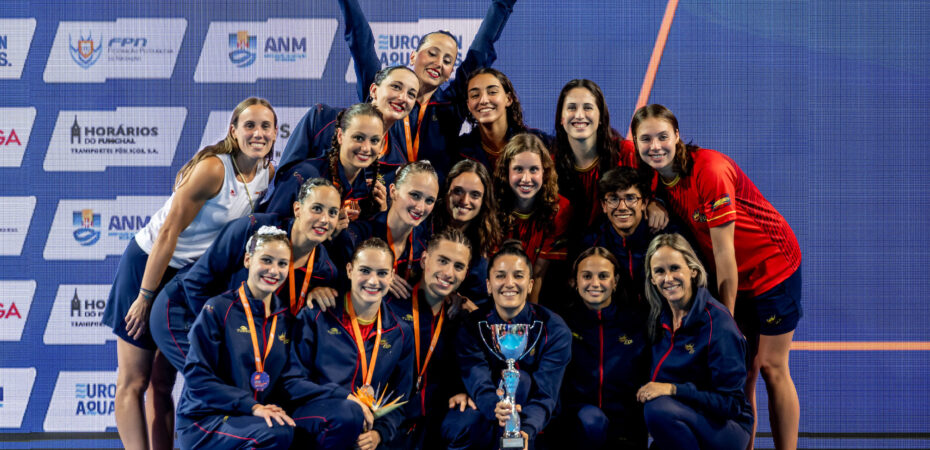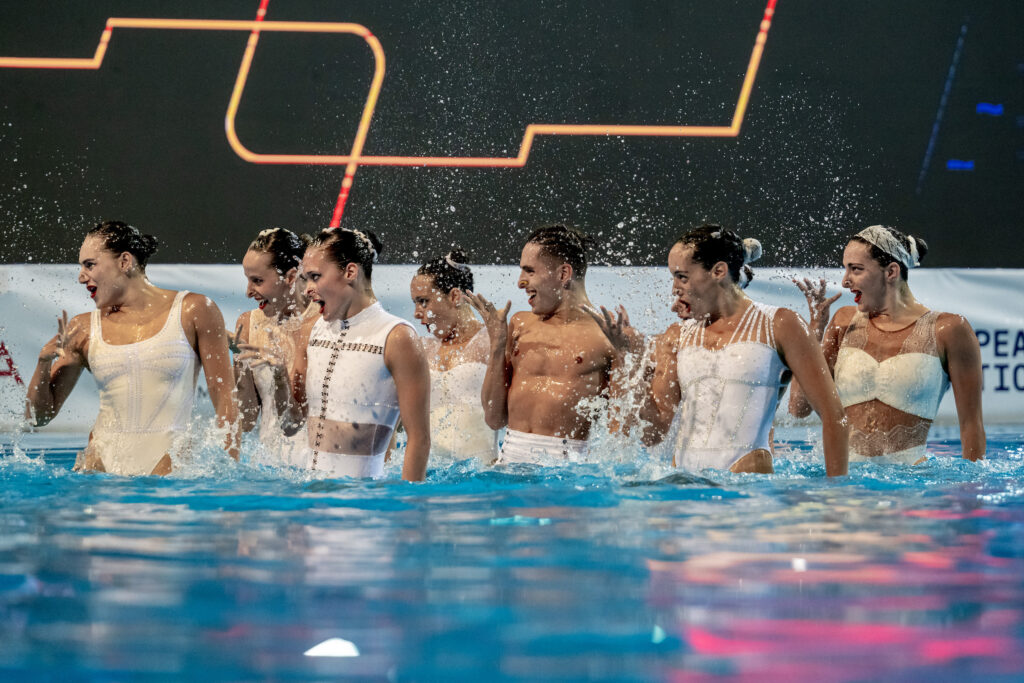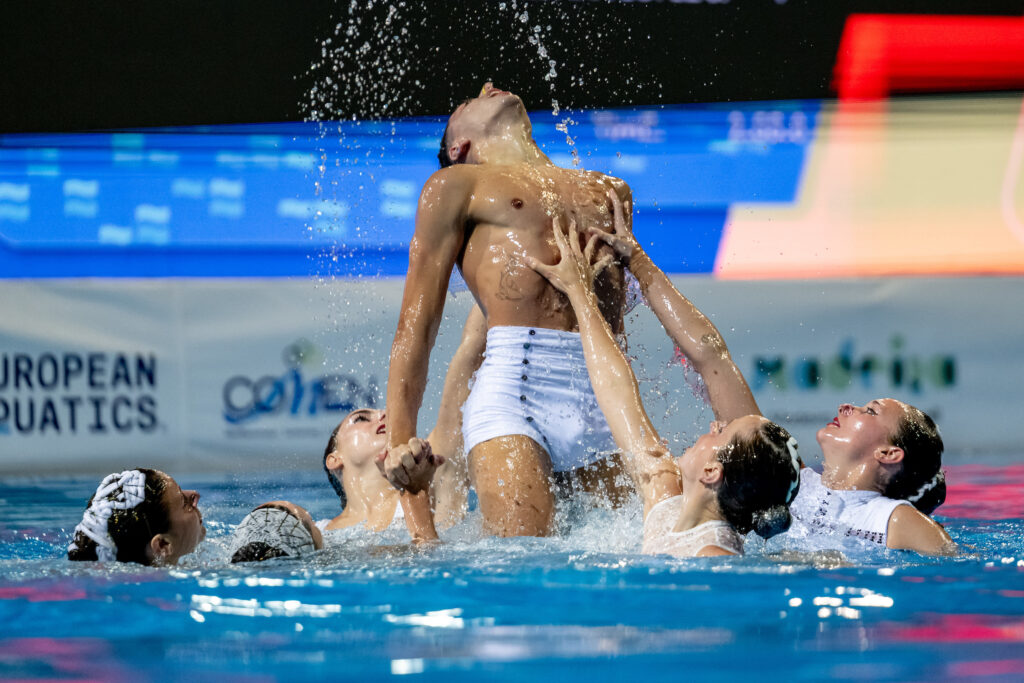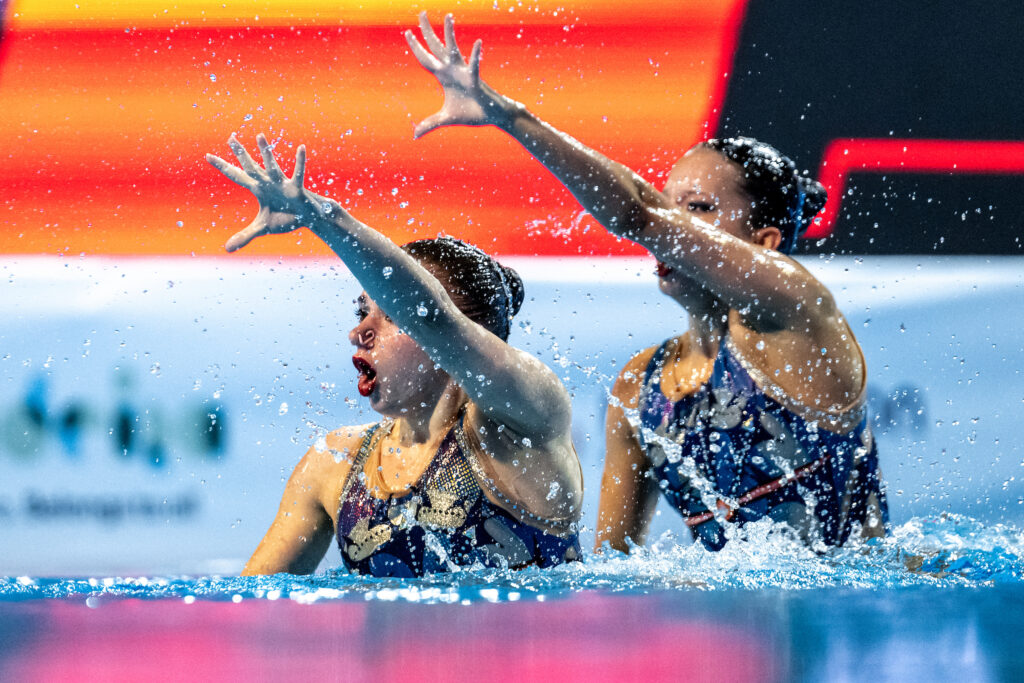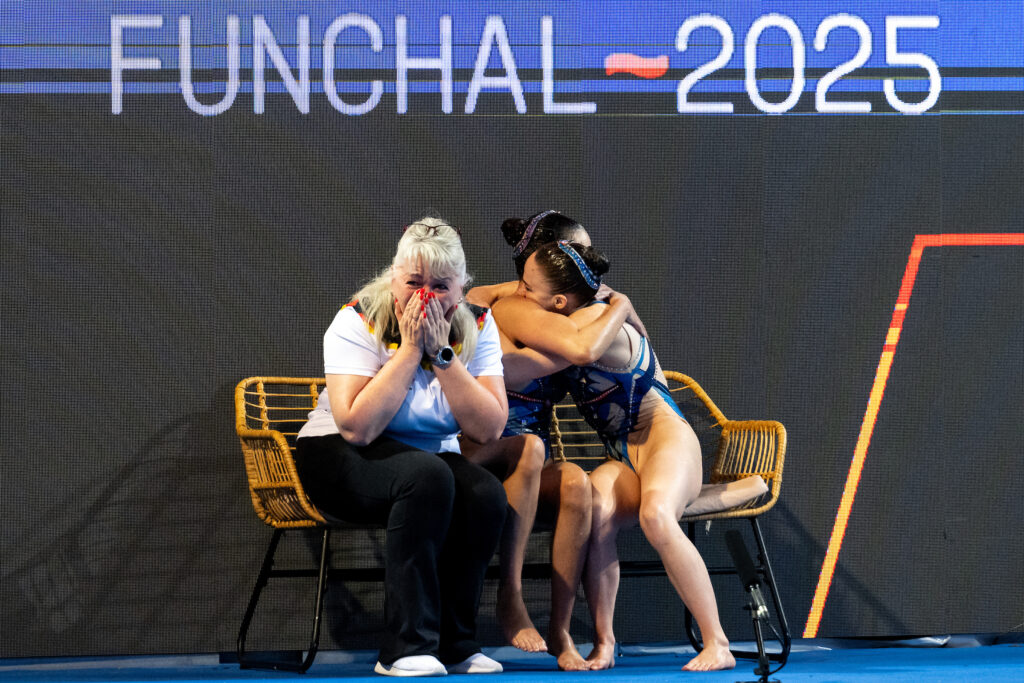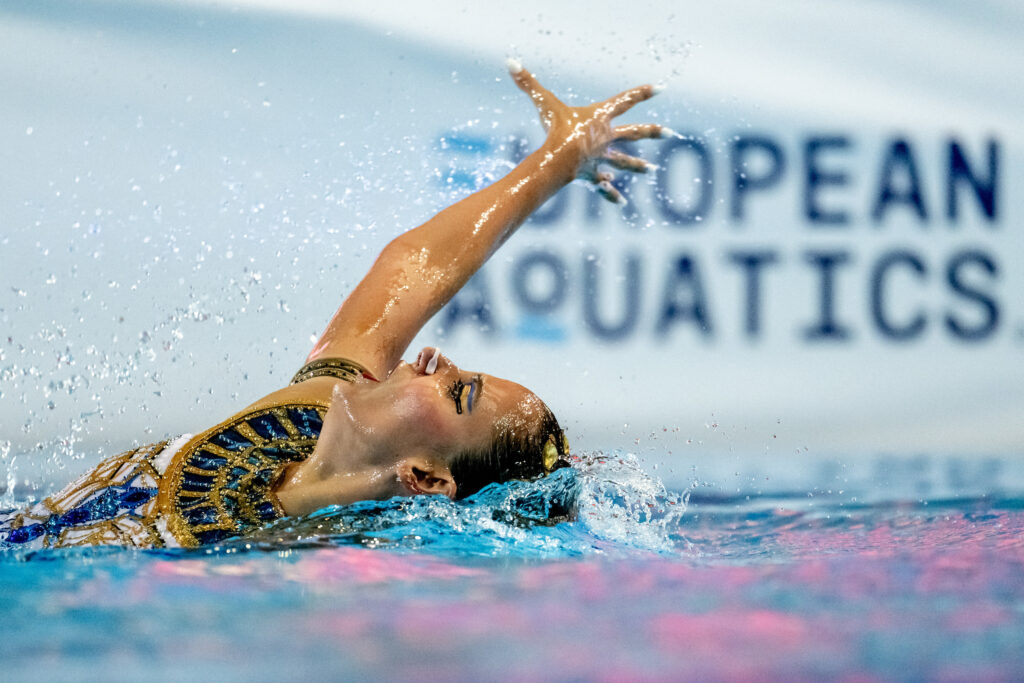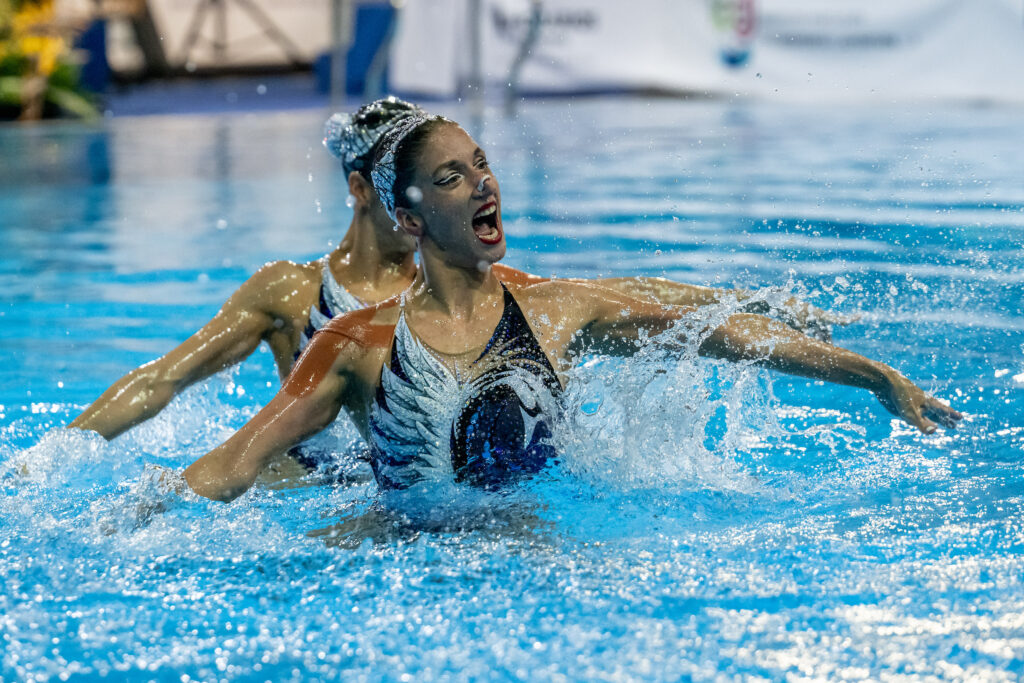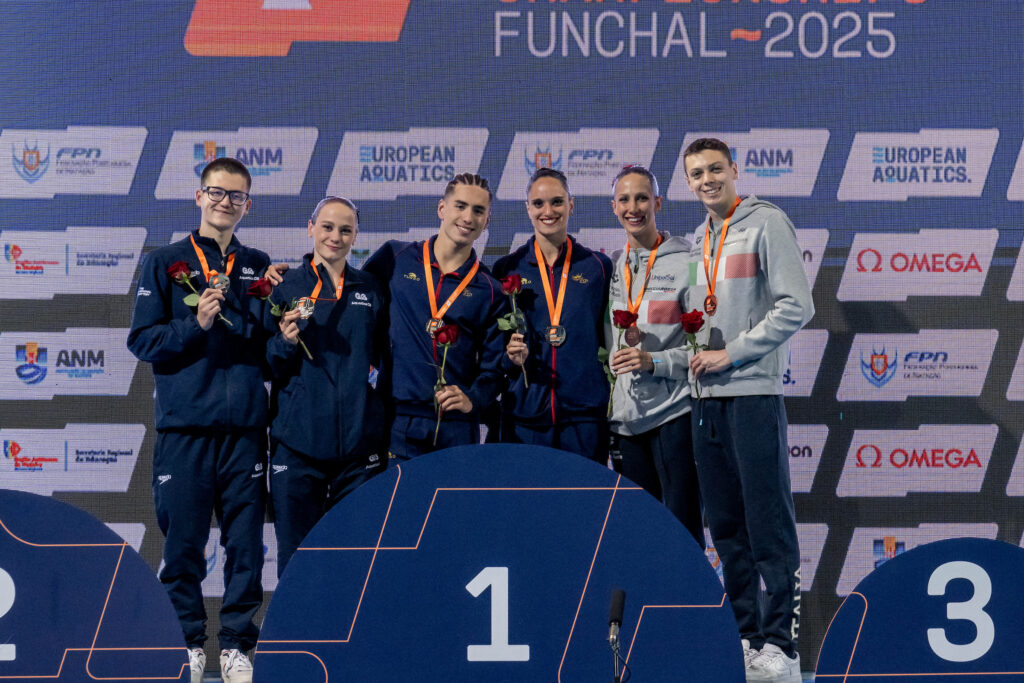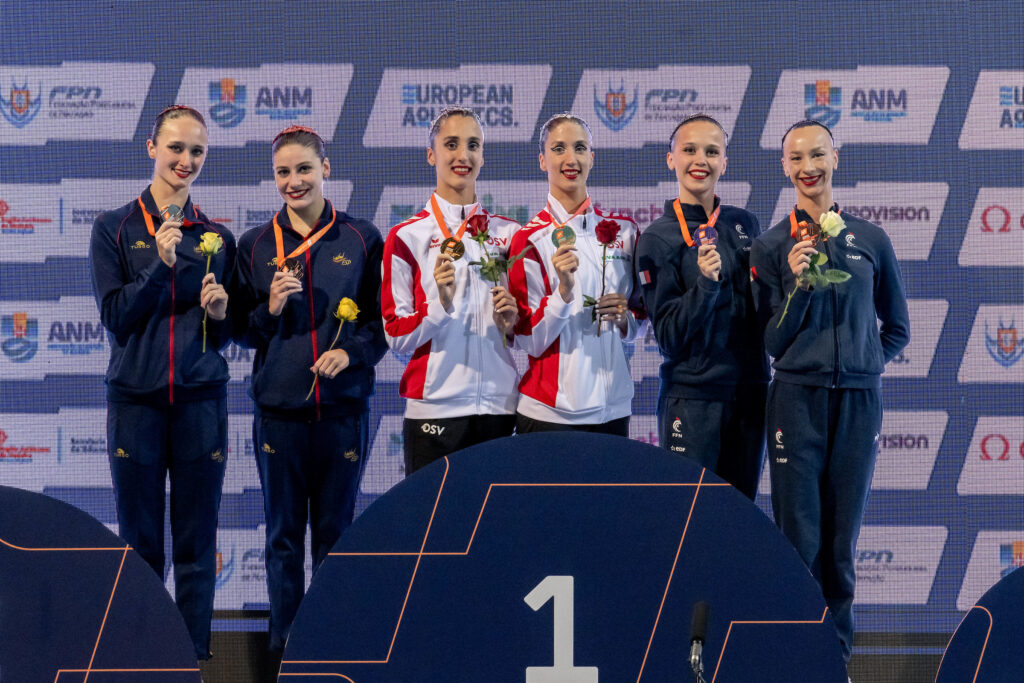The 2025 European Aquatics Artistic Swimming Championships came to a close in Funchal, Madeira, after four days of high-level competition, history-making finishes, and unforgettable routines. Spain emerged as the dominant force, winning medals in all 11 events on the program, including five gold, and capturing the overall Championships Trophy. But they weren’t the only ones to make waves.
Spain’s extraordinary run in Funchal was marked not just by consistency, but by versatility, memorable performances, and artistic innovation. The team medaled across every solo, duet, mixed duet, and team event, an unmatched feat this week.
Spain leaves Funchal as European Champion in the men’s free solo, technical mixed duet, free mixed duet, technical team (third title in a row), and free team. While the Spaniards have appeared in every stop of the World Cup circuit this season, they still had some surprises in store for this competition.
The talk of the pool was undoubtedly the long-awaited new acrobatic team choreography, and it certainly lived up to the expectations. The squad delivered a groundbreaking, risqué and riveting choreography set to Lady Gaga’s “Abracadabra”, which was an instant hit with the crowd and virtually everyone around the pool.
Perfectly weaving intricate and demanding choreography with risky acrobatics, the routine was bursting with energy and personality; it was obvious how much the athletes enjoyed performing it. The swim notably earned two perfect 10s on one acrobatic element, a massive artistic impression score, and an impressive bronze medal despite a basemark.
“We did our choreography only three weeks ago,” Txell Mas said. “We tried to replicate the movements of Lady Gaga’s music video in the water. Our message is to show the freedom of love, that every kind of love is okay, that you can be free to be yourself, and that we have to keep fighting for this. We are happy that we could bring this routine to life here, at these European Championships. We love it so much and are very proud of what we did today.”
Dennis Gonzalez Boneu, the defending champion in the men’s technical solo, also debuted a brand-new routine to Billie Eilish’s “Lovely” in that event. Unfortunately, he was hit with a zero on one of his technical required elements, which ended up being a costly error in a tight field. Even so, his artistry and execution on the remaining elements still carried him to bronze.
“Today was not very good, but not every day can be a good day,” he said after his swim. “I enjoyed the routine, but I made a mistake that I will correct for the next competition. This is a learning experience. I think now, it’s more about my mindset, because when I train, I train well. But in competition, it’s easier for me to do routines with my teammates. The solo makes me feel small. I need to prepare more to handle this pressure and to show how well I can do it. Because I know I can. I am happy to still have a medal, and also for my friends on the podium today, they deserve it a lot.”
In the men’s solo free, it is also worth noting the performance of Jordi Caceres, who captured gold in stunning fashion, making his senior European Championships debut one to remember. Swimming to “Gimme All Your Love” by Alabama Shakes, the 20-year-old impressed with power, control, and a mature sense of musicality.
Italy, second in the overall medal table with eight medals in total, claimed two historic golds: its first-ever European titles in both duet and team events. In the free duet, Enrica Piccoli and Lucrezia Ruggiero looked tremendous in their new “Hypnosis”-themed routine, winning gold in their very first international competition together.
The Italian squad followed that up with another standout performance in the acrobatic team final, performing a lively and precise “Chicago” routine that sealed their second gold of the week. With reigning champion Germany absent from the event, Italy seized the opportunity and delivered under pressure.
“This is a really good feeling, we didn’t expect it because we only had the third degree of difficulty,” Alessia Macchi said. “When we finished, seeing everyone cheering for us was such an amazing feeling, we knew we had just done our best routine.”
The Italians also unveiled their new free team routine, themed “Angels & Demons.” Although it didn’t quite come together as planned — it received a basemark but still earned silver —, it offered a glimpse of their renewed ambition and commitment to evolving their style. More broadly, there’s been notable improvement in the Italians’ overall presentation and performance quality in the water, with the athletes becoming increasingly expressive and engaged with their routines.
Germany enjoyed another marvellous European Championships as well, led by 20-year-old Klara Bleyer. Bleyer made history by winning Germany’s first-ever solo European title in the free routine, before adding bronze in the technical solo and in free duet.
Funchal surely seems to hold a special kind of magic for Bleyer, who described her solo gold as especially meaningful. Two years ago at this very venue, she had won double gold in solo at the European Junior Championships, making this latest triumph feel like “a full-circle moment” in her flourishing career.
The duet bronze medal was arguably the biggest surprise of the entire competition. Bleyer and 17-year-old Amelie Blumenthal-Haz only started swimming together this season, and this was only their premiere of this new choreography, set to the music from the movie Nausicaä of the Valley of the Wind.
“We are very overwhelmed, it was a total surprise for us,” Bleyer said. “In general, we tried with this free routine to be more artistic, especially in the leg movements, because it’s more of our strength right now. We tried to give the judges different poses and not do the same movements over and over, it has paid off today. We are very happy and we are looking forward to working even harder.”
This marked the country’s first duet medal at the European Championships since 1983, and first as unified Germany.
Funchal also brought a lot of success to Austria’s Anna-Maria, Eirini and Vasiliki Alexandri as, for the first time, all three triplet sisters won gold in their respective events at the same championships.
After missing the 2024 edition, Anna-Maria and Eirini reclaimed the European technical duet title with masterful technique and sharp execution in an impeccable performance of their new Swan Lake routine. Swimming with the highest declared degree of difficulty (35.85), their huge score of 301.8800 set a benchmark in the final that proved unassailable.
“We are really happy,” Anna-Maria said. “Because we can perform our technical elements and the hybrids at a very high level and with great execution, but mostly because we succeeded with our new pair acrobatic element. It was new for us and we were a bit stressed about it, but we did very well. This is also the first time we passed 300-points, so this is a very big deal.”
After finishing fourth at the Paris Olympic Games and navigating the retirement of their longtime coach Albena Mladenova, the Alexandri sisters entered a period of uncertainty about their future in artistic swimming. Still, their deep love for the sport and renewed perspective have carried them forward, both in and out of the pool. As they reflected:
“We continue artistic swimming because it is our passion and we love our sport. Our sport psychologist told us: ‘You are not defined by an Olympic medal’. We have shown our level, performance, and consistency for many years, and in the end, we are also athletes. We are happy with our career, and we can learn something from everything. This time after Paris also helped us to take steps in other directions. We started doing other things, having other activities and hobbies. Sure, maybe we can still improve our social life a little bit more (laughs)… But this new balance in our lives helps us a lot now when we come to competitions.”
Sister Vasiliki Alexandri defended her European crown in the technical solo with a commanding performance of her “Cleopatra” routine, which she debuted just weeks earlier in the Markham World Cup. Despite only slightly increasing the degree of difficulty since, her execution scores soared, highlighting just how much sharper and more confident in the routine she had become.
“This gold really means a lot,” she said. “I was a little bit stressed because I had to wait the whole week to compete. It was long, but today, I felt very powerful and I think it showed in the water. I’m very happy I could repeat my success from last year. But honestly, I am just happy to be here at all. It has been a difficult season and we didn’t know what would be possible. We started a little bit late and we have only trained with our new coach [Takako Nakajima] for the past three months. So it is very meaningful to achieve this result.”
Great Britain’s Ranjuo Tomblin continued his rise with a stunning gold in the men’s technical solo, following a silver in this event in 2024 and a bronze in the free solo earlier in the meet. His confident swim to David Garrett’s The 5th showcased his trademark musicality, precision and consistency.
In the technical mixed duet, Tomblin was also joined for the first time by Isabelle Thorpe. The pair brought a dynamic new presence to the event, with Thorpe – who partnered Kate Shortman to two duet silvers at last year’s championships before taking silver at the Paris Olympics – making a surprise appearance there for the first time in her career.
Making a strong impression right off the bat, the pair came very close to the European title but had to settle for silver, although only 1.2526 points behind Spain.
“This is very exciting, as this is our first time swimming together in competition,” Thorpe said. “We’re really excited for the rest of the season and to see what we can do with a bit more training together. I’ve been really enjoying this experience, it’s so different for me. My whole career, I’ve been swimming duet with Kate. Actually this is my first competition without her at all, so it’s a bit strange, but I’ve really been having a lot of fun swimming with Ranjuo in mixed duet.”
After skipping the 2024 European Championships, Ukraine, France and Israel were back in medal contention, especially in the team events. All three faced significant turnover and waves of retirement after last season, and had brought a lot of new faces to this European stage, who clearly handled the pressure beautifully.
Ukraine left Funchal with silvers in the technical team and acrobatic team events. Their “Geometry of Magic” acrobatic routine notably featured the highest declared difficulty (23.213) of the field and was executed with typical Ukrainian sharpness, innovation and explosivity.
France clinched bronze in the technical team event. Bronze medallists in 2023 and fourth at the Paris Olympic Games, the French were solid in their “DJ Set” choreography, which was playful and irresistibly catchy, earning a place on the podium and showing that, even in transition, this team always remains a European contender.
Moreover, the Olympic duet of Anastasia Bayandina and Romane Lunel also claimed bronze in the technical event with its “Mamma Mia” choreography. This marked France’s first European duet medal since 2004, and clearly a significant step forward for these two athletes.
Finally, Israel earned bronze in the free team event with its “Spirit of Japan” routine. Although it incurred two basemarks, it still was enough to secure a spot on the podium.
Beyond the medalists, Slovakia had a quietly impressive championship, particularly in the duet events. The pair of Lea Anna Krajcovicova and Zofia Strapekova placed fifth in technical duet and sixth in free duet, establishing their place among Europe’s best and showing they’re a rising force to be watched. Both athletes also finished ninth in their respective solo events.
Türkiye also continued its upward trajectory, led by Ece Ungor, who notably ranked sixth in free solo, and 15-year-old Selin Hurmeric, a standout at the concurrent COMEN Cup and now part of the senior duet that placed ninth in the free event.
Funchal 2025 will be remembered not only for Spain’s sweeping dominance, Italy’s breakthrough golds, and Germany’s historic milestones, but also for the artistic growth and competitive depth seen across the continent.
Many of the athletes who made headlines here will return to the pool very soon, whether at the World Cup Super Final, the World Championships in Singapore, or the European Junior Championships at the end of June, where a new generation is already pushing to make its mark.
ARTICLE BY CHRISTINA MARMET
All photos: Giorgio Scala / Deepbluemedia
If you’ve enjoyed our coverage, please consider donating to Inside Synchro! Any amount helps us run the site and travel costs to cover meets during the season.

